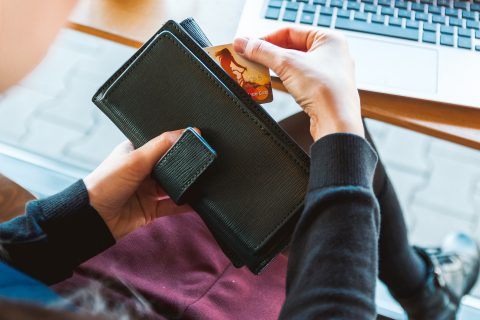5 Easy Ways to Protect Your Identity

Let’s talk about identity theft. It’s getting increasingly easy for a criminal to steal your identity, open various accounts, and use your credit for other nefarious things. No one wants to think about it happening, but it does.
By being active in your own protection, you make it harder for criminals to take your identity. I’m not saying that you have to drop your debit card and only pay in cold, hard cash. Instead, try these easy ways to protect your identity and keep thieves guessing.
1. Only Use Your Card Inside
I said you didn’t have to drop your debit card, but you should definitely stop using your card outside. Thieves like to install what’s called a “card skimmer” on machines outside. Some of the most popular locations include drive-thrus, ATMs, and gas pumps. While you think you’re just pumping up gas to go on a road trip with your friends, you’re actually transmitting your data to a thief that can use your information to spend massive amounts of money in your name.
What’s the easiest way to avoid this? Just don’t pay outside. Only use your card inside where cashiers or other employees can keep a watchful eye. It’s a little bit more of a hassle, but it’s a good way to protect a thief from getting your card information.
2. Create Strong Passwords
One of the most common targets for thieves is your phone. Why? Because we do everything on it. Literally everything. You can order a delicious latte from Starbucks with your saved card information and check your email where your bank could have sent you an update on your account—I’m sure the dangers are becoming clear by this point.
Typing in a number password can be annoying, but it’s an excellent way to protect yourself. Avoid easy passwords like your birthday/year, anniversaries, and other easy-to-find dates. Additionally, never use your PIN as a password. Think of something unique to lock your phone.
You can also lock sensitive apps on your phone, like your bank or student loan app. Several apps that contain sensitive information will allow your to keep your information confidential so that only you should have access to it. iProtect, Lockinfo, Perfect AppLock and Applock are a few great apps on the iPhone and Android that you can use. With these apps, you can put a lock on individual apps and keep that information behind lock and key—so to speak.
3. Avoid Public Wi-Fi
There are few things more exciting than free Wi-Fi, especially to young adults. You can hop on your social media accounts, catch up with your friends and fave their recent pictures, and even order from restaurants with the click of a button. All of this may seem innocent, but as you were order your double soy caramel latte, a thief could have captured your card number and other information while you were paying.
Public Wi-Fi is dangerous because anyone can access it—and I mean anyone. When you’re on a public network your our private info can be intercepted because it isn’t encrypted. Avoiding public Wi-Fi is one of the best ways to protect yourself. Any time you sign into a network without having to input a WPA or WPA2 password, you’re on a public network. If you’re unsure, it’s always better to use a bit of LTE data than be sorry.
4. Shred Documents
Almost all of our notifications and updates come through our email, but state, federal, and bank information probably still comes through the mail. These documents can contain your bank account number and even your Social Security number—perfect targets for a thief. Many people just choose to throw away these papers, but criminals aren’t afraid to dig through your garbage to find these documents.
For example, your W2 could be useless when you’ve filed your taxes, but should you just throw out the papers? Definitely not. Before you toss it in the trash, run it through a paper shredder—you can pick up a paper shredder for around $20-$50. They fit over a wastebasket and protect your sensitive data by making it too difficult for a criminal to piece the papers back together.
5. Subscribe to a Protection Service
By far, one of the easiest things you can do to protect your identity is to subscribe to an identity protection service. These companies stay updated on the latest methods used by criminals to take your data and let you know what you can do to help protect yourself on a regular basis.
Some of the top companies only cost around $10-$20 per month, which is the about the price of that new MAC lipstick you’ve had your eye on. LifeLock, Identity Guard, and IdentityForce are three of the top identity protection businesses, and we’ve made it easy for you to read about them through our comparison.
Even with the cheapest plan, these companies keep an eye on your sensitive data—they also monitor black market websites where your info could be purchased and used by someone else. Should something happen where your identity is stolen, you’ll receive assistance in retrieving it and mitigating damage—something you’d have to do on your own if you aren’t subscribed.
In the end, it’s always nice to have someone there to watch your back and help you when something bad happens.
Last modified on March 6th, 2018










Show Comments +